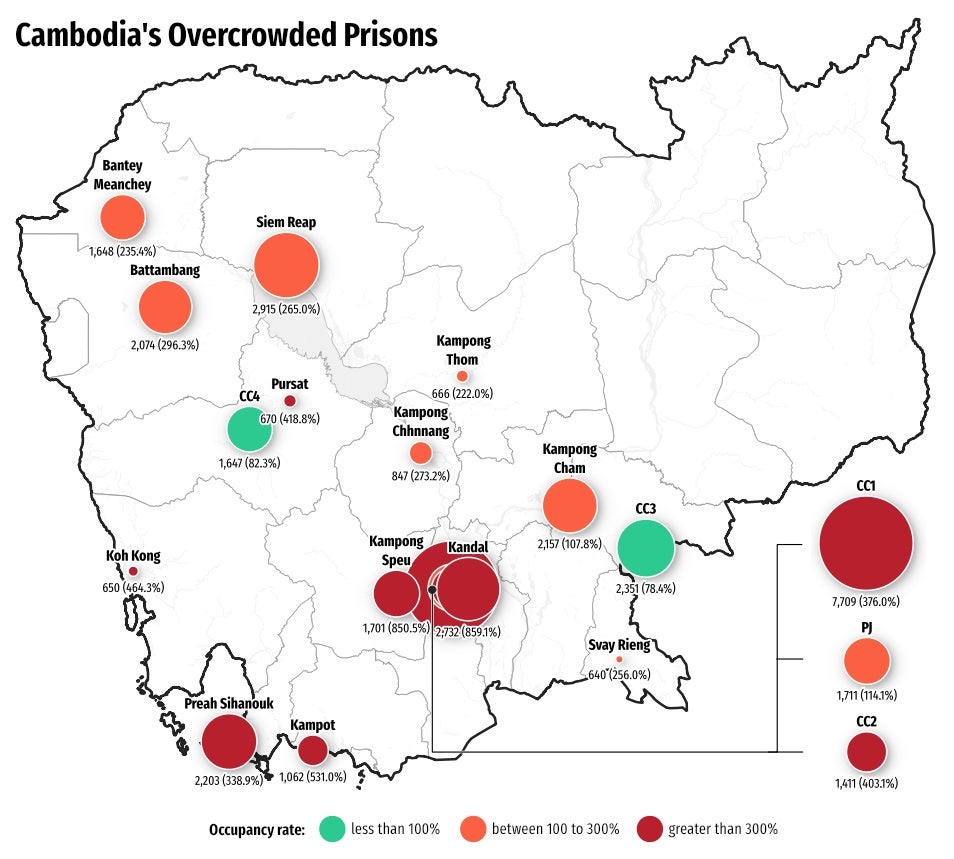Joint Statement: Cambodia: Urgently Protect Prisoners From COVID-19

Amnesty International, Human Rights Watch, and the Cambodian League for the Promotion and Defense of Human Rights (LICADHO) call on the Royal Government of Cambodia to take urgent action to safeguard the right to health of people in detention, prison officials, and the wider community by conducting rigorous testing of those in prisons for COVID-19, implementing effective hygiene and physical distancing measures in prisons, and taking immediate steps to reduce prison overcrowding. In recent weeks, a number of prison officials including General Department of Prisons director-general Chhem Savuth have tested positive for COVID-19. As these officials visited prisons at a time when they may have already contracted the virus, there is a significant risk of transmission to prisoners. Given the extreme overcrowding in Cambodia’s prisons,[1] lack of access to adequate medical treatment as well as basic necessities such as soap and clean water to practice safe hygiene, the almost 40,000 people imprisoned in Cambodia are at grave risk of contracting and potentially dying from the virus that causes COVID-19. While more than 250 prison officials at the same prison have reportedly been tested for the virus,[2] no prisoners in Phnom Penh’s Correctional Center 1 (CC1) have been tested for COVID-19 – even after potential contact with the department director who tested positive. Given the contagious nature of the coronavirus, especially within enclosed settings, authorities must immediately devise and implement a proactive plan for monitoring any potential infection across the detainee population.
The Guidance issued in March 2020 by the World Health Organization (WHO) on “Preparedness, prevention and control of COVID-19 in prisons and other places of detention,” urges governments to immediately consider the release of those at heightened risk of serious effects from COVID-19, such as older people, those with underlying health conditions, and pregnant women, in addition to taking measures to reduce prison populations by considering the conditional or temporary release of pre-trial detainees, people held for minor offences or nearing the end of their sentences, as well as women incarcerated with their children, and detainees who are under 18. We remind the Cambodian authorities that the right to health applies to everyone equally, that people in detention have an equal right to adequate healthcare as those in the wider community and that the state is responsible for providing healthcare to those it has deprived of their liberty.
The transmission of COVID-19 in Cambodia’s poorly equipped and extremely overcrowded prisons could be devastating. In several prisons, prisoners often have less than one square meter of personal space per prison cell and access to clean water is severely limited. This makes implementing COVID-19 safety measures such as physical distancing and frequent hand washing almost impossible. In response to video footage revealing inhumane levels of overcrowding within a Cambodian prison published in April 2020, department of prisons spokesman Nouth Savna admitted that the prison overcrowding crisis was a “ticking time bomb” for a major COVID-19 outbreak.[3] So far, almost seven months later, the authorities have failed to address prison overcrowding, test prisoners potentially exposed to COVID-19 or provide prisoners with sufficient resources required to practice safe hygiene. This could result in an unnecessary and preventable major public health and human rights crisis. Cambodian prisons have long been dangerously overcrowded. In May, Cambodia’s new Minister of Justice Koeut Rith announced a range of reforms to Cambodia’s justice system intended to address the severe backlog of pending cases in Cambodia’s courts and the extreme overcrowding in its prisons.
These measures included the expansion of alternatives to incarceration, including bail and suspended sentences, as well as early and conditional release for current prisoners.[4] Unfortunately, these measures have so far failed to significantly reduce overcrowding in prisons given the ongoing incarceration of new inmates, and more comprehensive measures are clearly needed to drastically reduce the prison population. In her 2020 report to the Human Rights Council, the United Nations Special Rapporteur on the situation of human rights in Cambodia, Rhona Smith, noted that the average occupancy rate in the country’s prisons was more than 300 percent over its actual capacity. She also noted that of the almost 40,000 people locked in Cambodia’s prisons, more than a third were still in pre-trial detention.[5] The overuse of pre-trial detention is a major contributor to overcrowding in Cambodian prisons and often violates accused persons’ fair trial rights. We call on the Cambodian authorities to take urgent measures to protect the right to life and health of everyone deprived of their liberty in Cambodia. We further call for the authorities to respect and uphold the right to a fair trial – including the right to the presumption of innocence – of everyone accused of criminal offences and to ensure that pre-trial detention is only ordered as an exceptional measure of last resort. People who have been convicted of minor offences, prisoners nearing the end of their sentences, older people, prisoners with underlying medical conditions, women incarcerated with children, pregnant women, and child prisoners should be prioritised for release. Amnesty International, Human Rights Watch, and LICADHO urge the Cambodian authorities to decisively address the human rights crisis plaguing the country’s prisons. We call for immediate action from the Cambodian government, in particular to: [1] LICADHO, Time for Bail: Ending Needless Mass Detention in Cambodia, October 2018, https://www.licadho-cambodia.org/reports.php?perm=227 [2] Voice of Democracy, “No Prisoners Tested Despite Contact With Covid-19 Infected Director”, December 2020, https://vodenglish.news/no-prisoners-tested-despite-contact-with-covid-19-infected-director/ [3] Al Jazeera, “Amnesty Video Show ‘Extreme Crowding’ in Cambodia Prison”, April 2020, https://www.aljazeera.com/news/2020/4/11/amnesty-video-shows-extreme-overcrowding-in-cambodia-prison [4] Voice of America, “Justice Ministry Reforms Will Hasten Court Procedures to Reduce Prison Overcrowding”, May 2020, https://www.voacambodia.com/a/justice-ministry-reforms-will-hasten-court-procedures-to-reduce-prison-overcrowding-/5425872.html [5] OHCHR, “Situation of Human Rights in Cambodia, August 2020, https://cambodia.ohchr.org/sites/default/files/Annual-reports/A_HRC_45_51_AEV%20(1).pdf.
Read the full article at the original website
References:
- https://apps.who.int/iris/bitstream/handle/10665/336525/WHO-EURO-2020-1405-41155-55954-eng.pdf?sequence=1&isAllowed=y
- https://www.unodc.org/documents/justice-and-prison-reform/Nelson_Mandela_Rules-E-ebook.pdf
- https://www.unodc.org/documents/justice-and-prison-reform/Bangkok_Rules_ENG_22032015.pdf
- https://www.licadho-cambodia.org/reports.php?perm=227
- https://vodenglish.news/no-prisoners-tested-despite-contact-with-covid-19-infected-director/
- https://www.aljazeera.com/news/2020/4/11/amnesty-video-shows-extreme-overcrowding-in-cambodia-prison
- https://www.voacambodia.com/a/justice-ministry-reforms-will-hasten-court-procedures-to-reduce-prison-overcrowding-/5425872.html
- https://cambodia.ohchr.org/sites/default/files/Annual-reports/A_HRC_45_51_AEV%20(1).pdf
